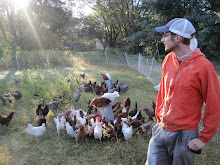Dear Lady Who Gave Me A Really Hard Time About Our Price Today,
Hi, my name is Elliott, you might remember me from today, when you gave me a really hard time about the price?
The conversation went something like this.
"How much for the eggs?"
"$4.75."
"For...?"
"A dozen, ma'am."
Then you reacted like I was charging 10 million
rubels for a loaf of bread during the Russian revolution.
I don't have a problem with folks who think our price is too high, its up to you to decide whether our products are worth your hard earned money.
I do have a problem when someone seems personally offended by the price. That react like cheap food is their God-given right and that farmers are supposed to practically give their work away and take the few pennies thrown their way. Well, there is a place where you can get that, its called a grocery store. Do I go to where you work and say, "Oh, you make how much? To do THAT? That is really unfair, you should make less money."
It's certainly a fair question to ask how we arrived at our price. The answer is that this is what we need to charge to make a fair wage, which means a basic standard of living and a Farm Rolls Royce.
In depth:
- We work extremely hard to produce the best food that money can buy. We work in the rain, in the cold, in the heat, we work when we don't want to work, and then we work some more. You're never really off and unexpected problems are always cropping up, and they don't care whether its midnight or on Sunday.
- We are a small farm and there are advantages to this, namely - we can maintain high quality control, are more environmentally sustainable, and can provide great lives for our animals. However we cannot operate on an economy of scale or get discounts by buying huge amounts of feed. Even still - our prices are competitive with the higher end eggs sold in stores.
- We understand that you can find "farm eggs" for cheaper prices. But there is a big difference between those eggs and pastured eggs - which are the best, highest quality eggs you can buy. We do not have a few chickens running around in the yard, we are a
legitimate, consistent, and accountable business that makes our products conveniently available to consumers, and there are costs associated with that.
- We love providing great food for people and we want to keep doing it. The only way we can do that is if we are financially sustainable.
I don't mean to come off as a martyr. It is just disconcerting when you put your heart and soul into your work and you are treated like a criminal for trying to make an honest living.
One more anecdote and I will get off my soapbox. Today I woke up at 6:30am, took care of the birds, set up to sell eggs in Savannah at 9:30am, ran my table until 1:00pm, came home and spent the next 2 hours in the rain putting down hay in our birds' coops and living areas. Tonight I went back out in the rain to put 200 soaked teenage hens inside their coops so they wouldn't get sick from exposure.
That is why our eggs are $4.75.
Elliott





